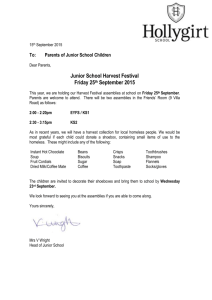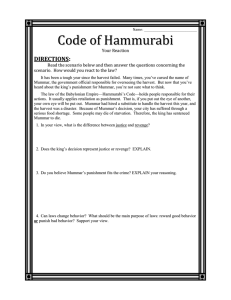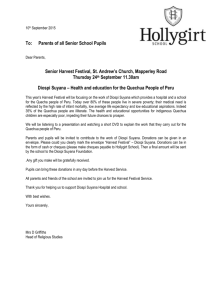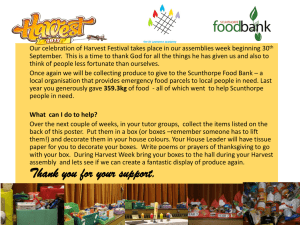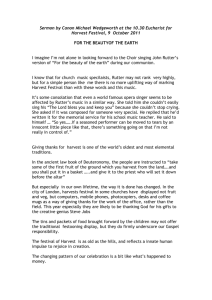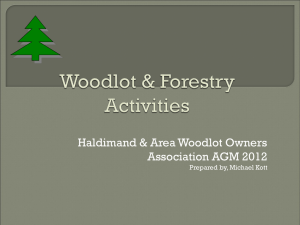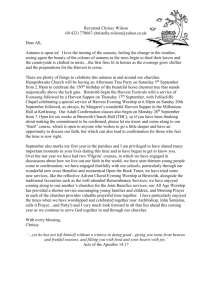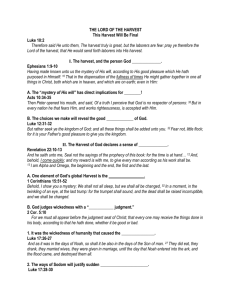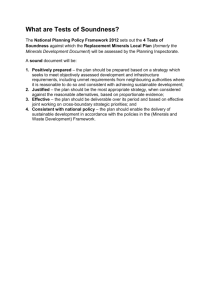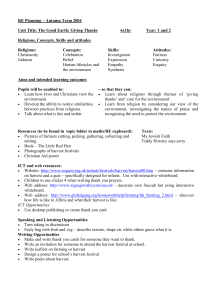Sunday 18th October
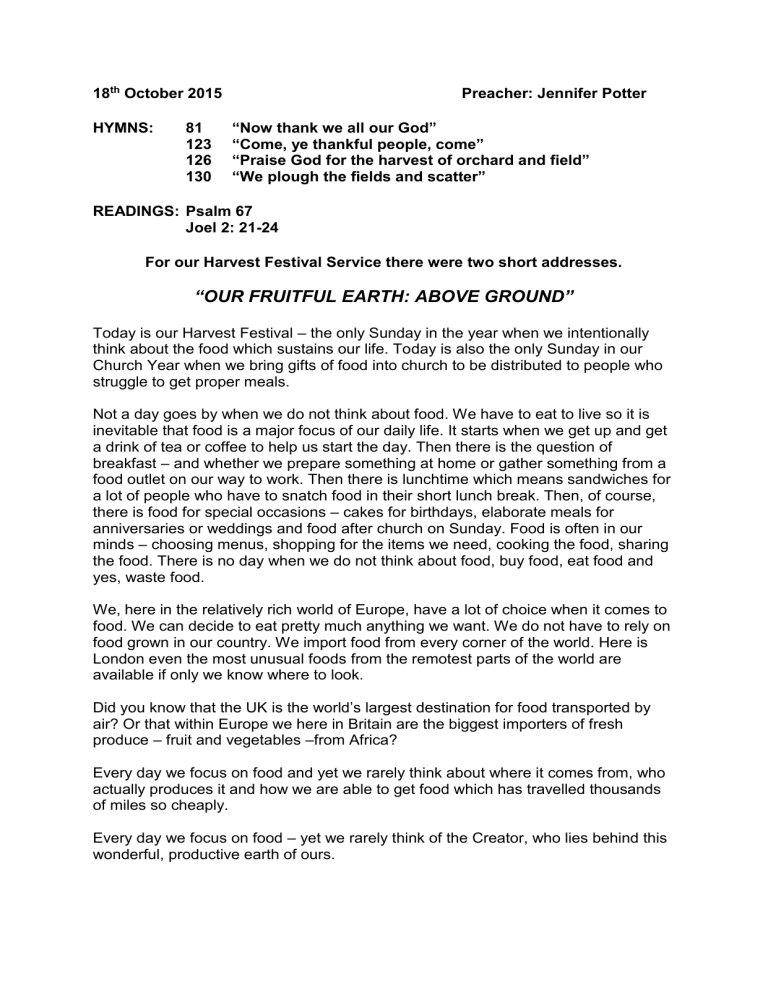
18 th October 2015 Preacher: Jennifer Potter
HYMNS: 81
“Now thank we all our God”
123 “Come, ye thankful people, come”
126 “Praise God for the harvest of orchard and field”
130 “We plough the fields and scatter”
READINGS: Psalm 67
Joel 2: 21-24
For our Harvest Festival Service there were two short addresses.
“OUR FRUITFUL EARTH: ABOVE GROUND”
Today is our Harvest Festival – the only Sunday in the year when we intentionally think about the food which sustains our life. Today is also the only Sunday in our
Church Year when we bring gifts of food into church to be distributed to people who struggle to get proper meals.
Not a day goes by when we do not think about food. We have to eat to live so it is inevitable that food is a major focus of our daily life. It starts when we get up and get a drink of tea or coffee to help us start the day. Then there is the question of breakfast – and whether we prepare something at home or gather something from a food outlet on our way to work. Then there is lunchtime which means sandwiches for a lot of people who have to snatch food in their short lunch break. Then, of course, there is food for special occasions – cakes for birthdays, elaborate meals for anniversaries or weddings and food after church on Sunday. Food is often in our minds – choosing menus, shopping for the items we need, cooking the food, sharing the food. There is no day when we do not think about food, buy food, eat food and yes, waste food.
We, here in the relatively rich world of Europe, have a lot of choice when it comes to food. We can decide to eat pretty much anything we want. We do not have to rely on food grown in our country. We import food from every corner of the world. Here is
London even the most unusual foods from the remotest parts of the world are available if only we know where to look.
Did you know that the UK is the world’s largest destination for food transported by air? Or that within Europe we here in Britain are the biggest importers of fresh produce
– fruit and vegetables –from Africa?
Every day we focus on food and yet we rarely think about where it comes from, who actually produces it and how we are able to get food which has travelled thousands of miles so cheaply.
Every day we focus on food – yet we rarely think of the Creator, who lies behind this wonderful, productive earth of ours.
Every day we focus on food 0 yet we scarcely ever think about those who do not have enough to eat and face famine and hunger.
Today is our Harvest Festival
– not just a day to give thanks that the harvest is safely gathered in here in Britain and not just a day to bring our gifts for the work of the
Whitechapel Mission with people who are homeless. Today is a day to think seriously about God the Creator, who sustains us through the produce of our fruitful earth. Today is a day of profound thanksgiving to God that we have food to sustain our life.
Today is also a day to think about our often carefree and even careless attitude to food – an attitude which would shock our grandparents and people living in the poorer parts of our world.
It has been calculated that 3.6 million tonnes of discarded food is collected by Local
Authorities in the UK each year. Fruit and vegetable waster makes up 42% of all household waste in Britain. This should shock us – such a level of waste is a sin. It means that we do not take food seriously enough. It means we buy too much in the first place, we forget about food at the back of the fridge until it is inedible and we are reluctant to eat food that looks less than perfect. On this harvest festival day let us show our thankfulness to God by being more serious in our attitude to food. It is
God’s sacred provision for us but we have allowed food to become part of our throwaway culture.
Friday 16 th October was World Food Day and it was also the 70 th anniversary of the
United Nations Food and Agriculture Organisation. That organisation tries to ensure that all countries can produce or import food for their people and that people around the world can afford to grow or buy proper food. The current slogan of the Food and
Agriculture Organisation is ‘zero hunger challenge –united for a sustainable world.’
It is estimated that 1 billion people go hungry around the world each day
– for children this affects their physical and mental growth and blights their life chances.
Our lifestyle decisions affect the choice of crops grown in many parts of the world, affect the prices of those products and affect the priorities of food processing companies.
So on this Harvest Festival Day let us give thanks to God for the food we have and let those thanks be expressed in practical ways – in how we buy and store food and in how we care about the effect of our food decisions on others around the world.
“OUR FRUITFUL EARTH: BELOW GROUND”
Harvest Festivals usually focus on crops and animals
– we give thanks for the food that we harvest above ground. Yet our earth has layers of soil and rock which are productive below ground. Of course, there are a number of crops which are harvested from below ground level
– staple crops like potatoes and vegetables like carrots, turnips and swedes.
In some of the desert areas of our world plants growing within the sandy depths are a main source of food and moisture for desert dwellers like the Bushmen of the
Kalahari.
But there is a lot more below ground – all manner of minerals which we rely on – coal and oil, iron and a huge variety of metallic and non-metallic minerals. God in his good plan of creation put useful things below ground as well as putting in place the productive processes which create our topsoil.
Miners have been digging minerals from the earth from the beginning of recorded time and our civilisation has developed to a large extent through what we have been able to do with these minerals.
Coal has kept human beings warm for generations, allowed us to generate electricity and to smelt other minerals.
There are campaigns these days that want to stop us burning coal and oil because it causes pollution of the atmosphere and contributes significantly to global warming. It is true that we need to be more creative and less polluting in how we use these resources but, until technology is a lot more advanced we are still going to need to use these fossil fuels.
Oil – in the form pf petrol and diesel – not only fuels our transport and generates most of our electricity but also supplies us with a whole range of chemicals for making plastics, textiles and a whole host of every day products.
We derive iron ore and a lot of other metallic and other minerals from below ground.
There would be no possibility of preserving food by canning it if we did not have the minerals to make the tins.
None of us could have got to church this morning without the products of the mining industry – cars buses, trains and the roads along which pedestrians walk – virtually all forms of transport – okay not solar –powered cars – are made from metals and powered by oil or electricity derived in one way or another from minerals resources.
Most of us have small but very important devices in our pockets - the mobile phone.
To make such a device, small as it is, requires a whole host of minerals – tin, gold, titanium and coltan. Coltan is mined in remote areas of the Congo.
If there were to be no harvest of resources from below ground – our lives would be very different. Many of the devices, which we use day-by-day and which we take for granted, could not be produced. And the people who mine these commodities are often paid very little – just like the people who produce tropical fruits and vegetables for us.
So we not only need to give thanks for the harvest from below ground which allows us to have this range of modern devices, we need to work to ensure that those who mine for these products are paid properly and looked after in safe working conditions.
Last year at the Harvest Festival I told you about an iron ore mine I had visited in the
Northern Cape of South Africa. It was part of a project to try to ensure that mining is done safely with the minimum of negative effects on the environment and in a way that helps the local communities to develop well. This year, as part of the same initiative, I was at a diamond mine in the northern part of the Limpopo Province of
South Africa near the border with Zimbabwe.
Diamonds are beautiful crystals
– formed in and around volcanoes. They are just one of a myriad of beautiful stones which are part of the below ground harvest – rubies, emeralds, opals etc. When these are set in gold or silver or platinum – we have rings and jewellery with which to celebrate special occasions not least by providing the rings for weddings.
And by the way small diamonds are vital for cutting tools. The tunnelling devices which have been burrowing under London to provide us with Crossrail depend on thousands of small diamonds to cut through hard rock.
God created our world not only to sustain us by providing crops for food, and products from which we can make clothing and shelter but God created a world of beauty – above ground and below ground, too.
We are the stewards of this wonderful creation, and we are God’s co-workers in the ongoing work of creativity. Our responsibility is to use the earth’s resources carefully, sharing the resources and ensuring that God’s bounty is available for generations yet to come
– our children and grandchildren.
Today as part of our stewardship, let us give thanks for all the resources of our world and pledge ourselves to use them responsibly. Amen
